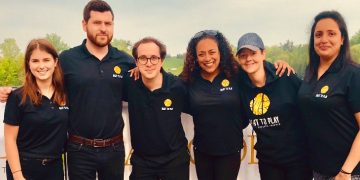Rethink the meaning of “career”
The word “career” derives its origin from Latin for a two-wheeled wagon. A two-wheeled wagon, however, isn’t very stable, and when we are very focused on building a career, it can be easy to get thrown off course when there are those inevitable bumps on the road of life.
We can also run into trouble when we are too focused on a narrow definition of what our careers should look like. I’ve heard from so many young professionals who are afraid of making a mistake in their job choices because they believe it will forever negatively affect their career. This keeps them from taking greater risks in finding work they will truly enjoy and thrive in. I also hear from later-in-life professionals who are afraid that a gap in their resume will look bad to prospective employers, holding them back from applying for jobs they really want or making a much-desired career switch.
Someone entering the workforce in 2018 will change jobs approximately 12-15 times over the course of their working life. This is now the norm and it’s actually OK to make changes and have small gaps on your resume, just as long as there are good explanations for them. Many employers are recognizing that there are benefits to having done different things and acquiring a portfolio of skills and experience, as opposed to staying in one job for too long. What’s important is that you can articulate why you’ve moved around and why there are gaps, as well as how these changes have contributed to your personal and professional growth.
I myself “downsized” my work a few years ago to take care of elderly parents. For me, this meant leaving a full-time corporate job and working for myself. In the process I acquired new skills (anyone who has ever navigated the medical system and been involved in patient advocacy will understand what I’m talking about) and found that my career path zigzagged a bit as I adapted to the realities of running a business. But in the end, I realized that this move opened up many more opportunities, both on the career and personal fronts.
Here are a few things I learned along the way:
Explain the moves and gaps in your resume, but don’t overshare information.
Stick to the essentials: why did the gap occur and what did you do during that time?
Stay connected.
Network, network, network, and stay up to date with developments in your field by attending industry events, reading articles and meeting with people.
Keep learning and upgrading skills.
Volunteering is a great way to keep your skills fresh and joining a non-profit board will help you make new professional connections while also giving back.
Understand which of your skills are transferable.
E.g. if as a volunteer you’ve coordinated an event, you probably have great project planning and management skills.
Keep your resume current.
Be sure to add all newly acquired skills and draw on volunteer and personal experiences to supplement where your resume has gaps. Don’t forget that it’s really important to adapt your resume to the context of each job application.
Become/stay active on LinkedIn.
Update your profile, grow your network, comment on people’s posts and write your own articles to show you are connected to up-to-date on what is going on in your field. Bonus: an active LinkedIn account is also more likely to grab the attention of recruiters.
Written by Kathrin Bohr. Kathrin has been working in the Impact space for over 15 years. For the past five years, she was the industry advisor for sustainability, CSR and the non-profit sector at the Schulich School of Business Career Centre. She holds an MBA from Schulich and recently opened a coaching practice specializing in Impact careers. To contact Kathrin email: impactcareerscoaching@gmail.com
Want more curated content delivered straight to your inbox?





No Comment